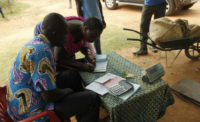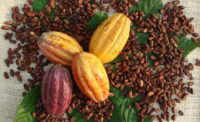WCF, partners announce $12-million investment in second phase of cocoa initiative
Annual partnership meeting draws more than 500 cocoa, chocolate industry representatives.

The World Cocoa Foundation and the U.S. Agency for International Development have announced a $12-million investment in cocoa production and services as part of the second phase of the foundation’s African Cocoa Initiative (ACI).
The five-year effort, whi ch was announced during the WCF’s annual partnership meeting in Cote D’Ivoire last week, will emphasize increasing production of quality cocoa planting materials and providing services to farmers in Cameroon, Cote D’Ivoire, Ghana and Nigeria. Launched in 2011, the first phase of the ACI involved establishing public and private sector models to support sustainable productivity growth and improved food security on diversified cocoa farms in West and Central Africa.
ch was announced during the WCF’s annual partnership meeting in Cote D’Ivoire last week, will emphasize increasing production of quality cocoa planting materials and providing services to farmers in Cameroon, Cote D’Ivoire, Ghana and Nigeria. Launched in 2011, the first phase of the ACI involved establishing public and private sector models to support sustainable productivity growth and improved food security on diversified cocoa farms in West and Central Africa.
 ch was announced during the WCF’s annual partnership meeting in Cote D’Ivoire last week, will emphasize increasing production of quality cocoa planting materials and providing services to farmers in Cameroon, Cote D’Ivoire, Ghana and Nigeria. Launched in 2011, the first phase of the ACI involved establishing public and private sector models to support sustainable productivity growth and improved food security on diversified cocoa farms in West and Central Africa.
ch was announced during the WCF’s annual partnership meeting in Cote D’Ivoire last week, will emphasize increasing production of quality cocoa planting materials and providing services to farmers in Cameroon, Cote D’Ivoire, Ghana and Nigeria. Launched in 2011, the first phase of the ACI involved establishing public and private sector models to support sustainable productivity growth and improved food security on diversified cocoa farms in West and Central Africa. WCF President Richard Scobey says last week’s annual meeting, attended by more than 500 representatives from the global cocoa and chocolate industry, illustrated a growing commitment to addressing issues such as deforestation, development of sustainable livelihoods and the empowerment of women and children in cocoa-producing communities.
“There was a strong endorsement of a shared vision for an inclusive cocoa future, where the focus is on sustainable livelihoods for farmers, a better-protected planet and prosperous businesses, from the farm level through to the chocolate maker, that create jobs and value,” he says.
CocoaAction — the voluntary, industry-wide cocoa sustainability strategy administered by the WCF — was cited as a strong framework for accelerating cooperation among all divisions of the cocoa and chocolate industry. In conjunction with discussions over the strategy’s results, the WCF released CocoaAction’s first annual report. A second report is expected in 2017.
Ivorian First Lady Dominique Ouattara also addressed the need to protect children from illegal forms of work. She applauded industry efforts to build and provide materials to dozens of schools, adding the Ivorian government has plans to build more than 4,500 classrooms and 37 secondary schools in cocoa-growing areas.
Furthermore, regional cocoa research scientists and representatives from government cocoa regulatory agencies addressed the growing impact of Cocoa Swollen Shoot Virus (CSSV), a disease fatal to cocoa trees. The virus, first detected in Ghana in the 1930s, now threatens cocoa crops in West Africa. Meeting participants agreed that a regional action plan is need to control the spread of CSSV.
Looking for a reprint of this article?
From high-res PDFs to custom plaques, order your copy today!






